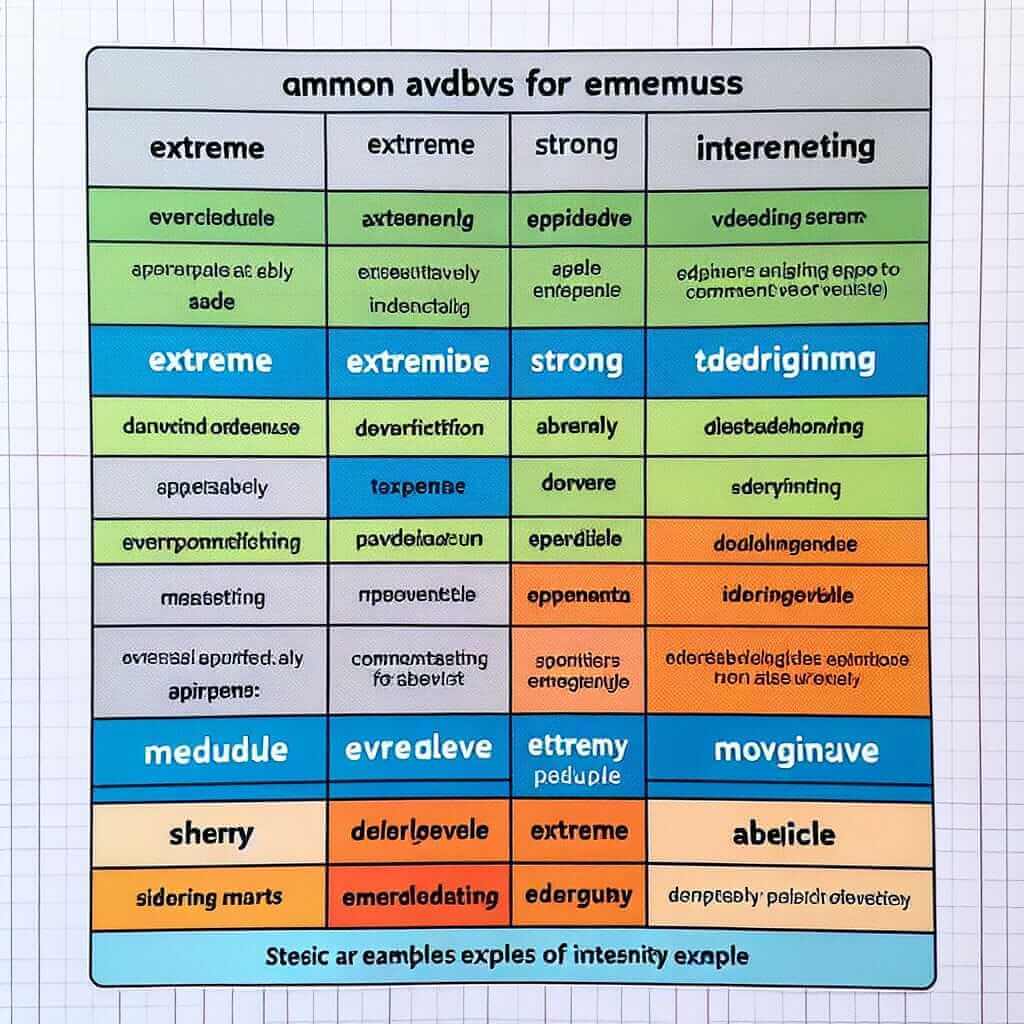In the realm of IELTS, demonstrating a strong command of the English language is paramount to achieving a high band score. One effective way to showcase your linguistic prowess is by skillfully employing adverbs for emphasis. Strategic adverb usage not only adds color and depth to your language but also allows you to express ideas with greater precision and impact, ultimately captivating your examiner.
For instance, consider these sentences:
- Without adverb: The movie was good.
- With adverb: The movie was absolutely captivating.
The first sentence is quite bland, while the second sentence uses the adverb “absolutely” to emphasize how good the movie was. This makes the sentence more interesting and descriptive.
Here are a few more examples of adverbs used for emphasis in different IELTS sections:
Speaking:
- “I completely understand your perspective on that issue.” (Here, “completely” emphasizes the speaker’s understanding.)
Writing Task 2:
- “Technology has undoubtedly revolutionized the way we communicate.” (“Undoubtedly” strengthens the claim about technology’s impact.)
Listening:
- “The speaker sounded genuinely passionate about environmental conservation.” (“Genuinely” highlights the speaker’s true feelings.)
As you can see, adverbs can significantly enhance your expressions. Let’s delve deeper into how to use them effectively.
Understanding Adverbs for Emphasis
Adverbs for emphasis, often called “intensifiers” or “emphasizers,” play a crucial role in amplifying the meaning of adjectives, verbs, or even entire sentences. They express the intensity, strength, or forcefulness of an action, quality, or opinion.
These adverbs are particularly useful in:
- IELTS Speaking: They help you express your opinions and feelings more clearly and emphatically, demonstrating fluency and a wider range of vocabulary.
- IELTS Writing: They add weight to your arguments, make your descriptions more vivid, and enhance the overall impact of your writing.
Using Adverbs for Emphasis: Rules and Examples
While using adverbs for emphasis can significantly boost your IELTS score, it’s crucial to use them correctly and avoid overusing them. Here’s a breakdown of their usage:
1. Placement of Adverbs
- Before the adjective or adverb they modify:
- “The food was incredibly delicious.”
- “He spoke extremely eloquently.”
- Before the main verb:
- “I completely agree with your point.”
- “She totally forgot about the meeting.”
2. Common Adverbs for Emphasis
Here’s a table highlighting some frequently used adverbs for emphasis categorized by their intensity:
| Intensity | Adverbs |
|---|---|
| Extreme | absolutely, completely, totally, entirely, utterly, thoroughly, perfectly |
| Strong | very, highly, extremely, really, terribly, awfully, deeply, incredibly, remarkably |
| Moderate | quite, rather, fairly, pretty |
3. Examples in IELTS Contexts
- Speaking Part 2: “One of my most cherished possessions is a vintage watch that belonged to my grandfather. It’s not particularly expensive, but it holds immense sentimental value.”
- Analysis: “Cherished” is a strong adjective choice, and “particularly” is used effectively to contrast with the following phrase. “Immense” emphasizes the strong emotional value.
- Writing Task 1 (Graph Description): “The graph shows a dramatic increase in online sales between 2010 and 2020. This trend is likely due to the rise of e-commerce.”
- Analysis: “Dramatic” effectively conveys the sharp rise in sales, while “likely” expresses a degree of probability.
- Writing Task 2 (Opinion Essay): “It is absolutely vital that governments invest in renewable energy sources to combat climate change.”
- Analysis: “Absolutely” emphasizes the urgency and importance of the statement.

Tips for Achieving a Higher Band Score
- Vary Your Adverbs: Instead of constantly relying on “very” or “really,” explore a wider range of adverbs like “highly,” “deeply,” “utterly,” or “profoundly.”
- Use Adverbs Sparingly: Avoid using too many adverbs in a single sentence or paragraph, as this can make your writing sound unnatural and exaggerated.
- Choose the Right Intensity: Consider the context and select adverbs that accurately reflect the level of emphasis you want to convey. For instance, “quite good” and “absolutely amazing” express different levels of positivity.
- Consider Colloquialisms Carefully: While some informal intensifiers like “totally” or “so” might be acceptable in the Speaking test, it’s generally advisable to stick to more formal adverbs in Writing.
Common Errors and How to Avoid Them
- Misplacement: Ensure your adverbs are placed correctly to modify the intended words. Incorrect placement can lead to confusion.
- Incorrect: “He speaks English very well.”
- Correct: “He speaks English very well.”
- Overuse: Using too many adverbs can make your writing sound redundant and unnatural.
- Overused: “The weather was extremely incredibly hot and humid.”
- Improved: “The weather was scorching and stifling.”
- Incorrect Choice: Make sure the adverb’s intensity aligns with the meaning you want to convey.
- Mismatch: “I am fairly ecstatic about the news.” (“Fairly” weakens the strong emotion of “ecstatic.”)
- Improved: “I am absolutely ecstatic about the news.”
Conclusion
Mastering the use of adverbs for emphasis is a valuable tool for boosting your IELTS score. By thoughtfully incorporating these adverbs into your speaking and writing, you can demonstrate a stronger command of the language, express your ideas with greater precision, and create a more compelling impact on the examiner. Remember to practice using a variety of adverbs, choose the appropriate intensity, and avoid common errors to enhance your overall performance.